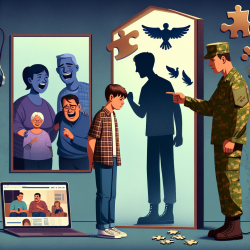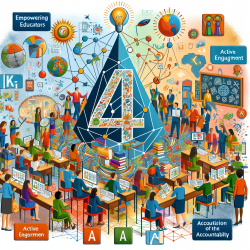Introduction
In the realm of child development, the family environment plays a pivotal role. Recent research titled "Associations between Family Weight-Based Teasing, Eating Pathology, and Psychosocial Functioning among Adolescent Military Dependents" sheds light on the profound impact that family dynamics can have on adolescents, particularly those in military families. This study is crucial for practitioners who aim to enhance their skills and improve outcomes for children through data-driven decisions.
The Study's Key Findings
The study involved 128 adolescent military dependents, with a mean age of 14.35 years. It was found that nearly half (47.7%) of the participants reported experiencing weight-based teasing (WBT) from family members. This teasing was linked to greater eating pathology, lower self-esteem, poorer social functioning, and increased depressive symptoms.
Implications for Practitioners
For practitioners, understanding these associations is vital. Here are some actionable insights:
- Recognize the Signs: Be aware of the potential psychosocial impacts of family WBT on adolescents, such as eating disorders and depression.
- Family-Centered Interventions: Encourage open communication within families about the effects of teasing and promote supportive interactions.
- Tailored Support: Provide targeted support for military families, who may face unique stressors that exacerbate the effects of WBT.
Encouraging Further Research
While this study provides valuable insights, it also highlights the need for further research. Practitioners are encouraged to explore:
- Longitudinal Studies: Examine the long-term effects of family WBT on adolescents' mental health and eating behaviors.
- Comparative Analysis: Compare the prevalence and impact of WBT in military versus civilian families.
- Intervention Effectiveness: Assess the effectiveness of different intervention strategies in mitigating the negative effects of WBT.
Conclusion
The study underscores the significant impact of family weight-based teasing on adolescent military dependents. By integrating these findings into practice, speech language pathologists and other practitioners can better support children in developing healthy self-esteem and psychosocial functioning.
To read the original research paper, please follow this link: Associations between Family Weight-Based Teasing, Eating Pathology, and Psychosocial Functioning among Adolescent Military Dependents.










